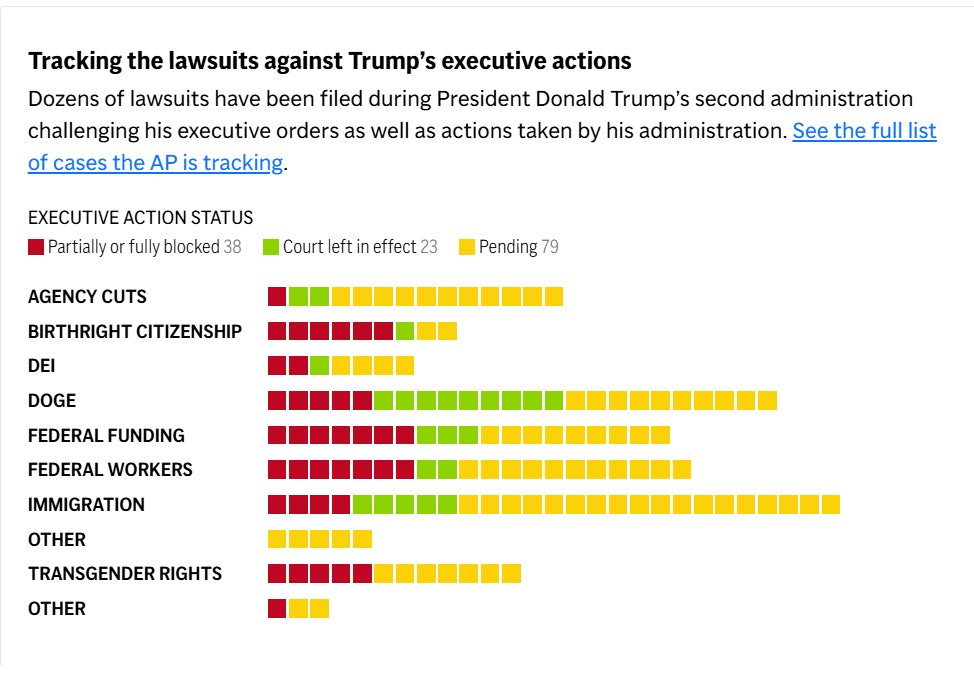Nine Republicans Bring the House to a Standstill—Over Babies
As I write this, the United States House of Representatives has stumbled into paralysis. On April 1, 2025, a routine procedural vote collapsed under the weight of intra-party revolt. The vote concerned the chamber's rules package—a typically unremarkable affair, necessary to conduct legislative business. Yet it failed, 206 to 222. Nine Republicans joined a unanimous Democratic caucus to vote it down. The result? The House is now inert. Until those nine Republicans reverse themselves, nothing moves—not the Trump agenda, not the business of governance, not even debate itself.
This is not a quirk of legislative arcana; it is a crisis. Speaker Mike Johnson, an institutionalist caught in the crosshairs of ideological fracture, is unable to act. A governing majority exists on paper but not in practice. What occasioned this deadlock? And why does a dispute over parental proxy voting threaten the constitutional machinery of government? The answers reveal something deeper than a squabble over rules. They unveil the fault lines within the conservative project itself.
Let us begin with the legislation at stake. The failed rules package would have cleared the path for three consequential bills: the Safeguard American Voter Eligibility (SAVE) Act, the No Rogue Rulings Act, and the STABLE Act. Each captures an essential plank of the current conservative agenda. The SAVE Act, championed by Representative Chip Roy of Texas, would amend the 1993 National Voter Registration Act by requiring documentary proof of citizenship for federal voter registration. This is no abstraction. In an age where border security has become porous and electoral safeguards have been weakened by progressive litigation, the integrity of the franchise demands vigilance. The SAVE Act seeks to ensure that the right to vote is reserved for citizens.
The second bill, the No Rogue Rulings Act, would curtail the ability of federal judges to issue nationwide injunctions against executive orders. The judiciary has grown fond of wielding the gavel as a veto pen. Conservatives remember well how a single district judge blocked President Trump's travel restrictions in 2017. This bill restores executive authority, placing necessary limits on a practice that has elevated individual judges to de facto lawmakers. The third measure, the STABLE Act, is less ideological but no less important. It addresses the rapidly expanding cryptocurrency market, proposing regulations for stablecoins to ensure financial predictability and consumer trust. Taken together, these bills advance a vision of electoral security, restrained judicial activism, and pragmatic financial oversight. In short, they reflect the conservative mandate renewed by voters on November 5, 2024.
Yet this mandate has been halted. The nine Republicans who voted against the rules package—Anna Paulina Luna, Tim Burchett, Mike Lawler, Kevin Kiley, Nick LaLota, Jeff Van Drew, Max Miller, Greg Steube, and Ryan Mackenzie—have frozen the House's ability to function. Without a rules package, the chamber lacks procedural scaffolding. It cannot deliberate, cannot vote, cannot legislate. The Constitution allows the House to elect a Speaker and seat its members. Beyond that, it is a ship without rigging. One might attempt to govern via Jefferson's Manual or general parliamentary law, but in a body of 435 members, such improvisation would produce not order but cacophony.
Why, then, did these nine Republicans rebel? The proximate issue is proxy voting—specifically, whether House members should be allowed to vote remotely for up to twelve weeks after the birth of a child. Representative Luna, who gave birth while in office, views this as a pro-family reform. She co-authored a resolution to this effect with Democrats Brittany Pettersen and Sara Jacobs and fellow Republican Mike Lawler. Luna then deployed a discharge petition, a rarely used procedural device, to force a floor vote. She obtained 218 signatures, including from several of the eventual rebels. The House GOP leadership, seeking to suppress the petition, embedded a poison pill in the rules package that would nullify it and foreclose future proxy reforms.
Faced with this maneuver, the nine defected. Some—Luna and Lawler foremost among them—objected to the substance. Others, like Steube, opposed the method: the leadership's suppression of a duly executed discharge petition struck them as procedurally abusive. Regardless of motive, the effect was the same. The rules package fell, and with it, the legislative capacity of the House.
A reasonable observer might interject: proxy voting? Is this worth disabling Congress over? On its surface, the concern appears parochial. Yet the dissenters see something more than parliamentary minutiae. For Luna and her allies, proxy voting for new parents is a modern pro-life stance. It enables legislators with newborns to remain present in their children's lives without surrendering their duty to constituents. For Lawler, a father of two, it is a "pro-family, pro-life" measure. Miller, whose daughter suffered post-birth complications, regards it as a matter of conscience. Even Steube, who opposes the underlying resolution, views the leadership's procedural gambit as corrosive. Their stance, in short, mingles principle with personal experience.
But the symbolic overtakes the substantive. Luna, at 35, is unlikely to bear children again during her congressional tenure. The others are men. Their cause, then, is not autobiographical but aspirational—a gesture toward making Congress more hospitable to younger, family-minded Americans. That goal is laudable. But it comes at a cost. The proxy voting fight has suspended a suite of bills that embody the very platform these Republicans profess to support. In pressing for procedural equity, they have inadvertently obstructed electoral integrity and constitutional restoration.
Could the House simply try again? In theory, yes. In practice, the math is daunting. The Republican majority is razor-thin—221 to 214, assuming full attendance. They can afford no more than three defections. On April 1, nine peeled away. To pass a revised package, Speaker Johnson must either win back most of the rebels or gain Democratic support. The latter is unlikely. Democrats are in no hurry to revive Trump’s legislative momentum. Their applause when the rules package failed was not subtle. They relish this Republican schism, and they have no incentive to bridge it.
Johnson, then, faces a dilemma. He can negotiate with the rebels, perhaps by decoupling the proxy voting issue from the rules package. But this risks alienating conservatives who view proxy voting as a constitutional hazard. Hardliners, including many in the Freedom Caucus, believe such measures dilute deliberative democracy and open the door to absentee governance. Johnson himself shares this concern. On the other hand, he can hold firm and hope the rebels relent. But Luna, buoyed by national media attention and committed to institutional reform, is unlikely to retreat easily. Thus the Speaker is caught between Scylla and Charybdis—governance and orthodoxy, compromise and cohesion.
Meanwhile, time passes. President Trump, inaugurated on January 20, 2025, has assembled a Cabinet to carry out his second-term vision. Marco Rubio at State, Pete Hegseth at Defense, Kristi Noem at Homeland Security, Scott Bessent at Treasury, and Elon Musk at the Department of Government Efficiency—these are not placeholder appointments. They signal a bold reorientation of executive priorities: muscular foreign policy, deregulation, administrative streamlining. But even the most ambitious cabinet needs legislative fuel. Without a functioning House, that fuel is denied. The machinery of reform grinds in neutral.
Here we encounter the true cost of this rebellion. Whatever the merits of the proxy voting debate, it is now a blockade. The House was designed to be the most responsive institution in our system of government—the "people's house."—and yet it lies dormant, sidelined by a procedural feud. The rebels, for all their claims to conscience, have subordinated national urgency to institutional reform. One need not question their sincerity to doubt their prudence.
A metaphor may help. Imagine a board of directors tasked with turning around a failing company. They meet to adopt new bylaws, enabling a slate of initiatives to increase revenue and cut waste. One director objects that the proposed bylaws would prevent maternity leave accommodations. She refuses to approve the rules. Others join her, citing procedural fairness. The board deadlocks. The company bleeds cash. Employees await reform, shareholders lose faith, the market recoils. So too with the House. Luna’s proposal is not irrational. But her chosen battlefield has engulfed the very institution she claims to protect.
And yet, the debate is worth engaging. The COVID-era experiment with proxy voting under Speaker Pelosi cast a long shadow. Republicans rightly objected that it undermined deliberation and accountability. Luna's resolution is more constrained: limited to parental leave, capped at twelve weeks, and designed to avoid quorum manipulation. It does not open the floodgates to absentee governance. Indeed, it may attract new talent to Congress—young parents who otherwise would decline to serve. Conservatives who champion family values should not dismiss this possibility. Still, the appropriate venue for this debate is the floor, not the rules package.
Can Democrats rescue Johnson with a compromise? They could. They won’t. They smell blood. The chaos benefits them. It stalls Trump's momentum, sows division in the GOP, and furnishes campaign fodder. Their refusal to assist is cynical, but predictable. The rebels miscalculated. They assumed Democrats shared their procedural priorities. Instead, they found applause across the aisle—not for their cause, but for their disruption.
Where does this leave us? With nine Republicans holding the gavel hostage. They can release it and pursue their cause through normal channels. Or they can dig in, magnifying dysfunction. The former honors conservative principles of prudence and governance. The latter reduces principle to vanity. Speaker Johnson must chart a path back to functionality. The rebels must weigh whether their symbolic stand merits a real-world breakdown. The House must decide whether it is an institution or an arena.
A final reflection. Conservatism, at its best, prizes order, duty, and the continuity of institutions. This moment betrays all three. The rebels assert a fragment of the good—family support—against the whole of governance. The House is not a sandbox for personal causes. It is a constitutional engine. When its parts rebel against coordination, the whole falters. As mereological essentialism would have it, parts are only as meaningful as their role in the whole. Luna and her allies may see themselves as reformers. But in refusing to govern, they risk becoming the very dysfunction they oppose.
If you don't already please follow @amuse on 𝕏.





They did it again. The few times the Republicans are in the majority, somehow they always either do something very stupid or simply capitulate or compromise to the disadvantage of most Americans with the Democrats. So it didn't surprise me to read of the nine "dissenters" basically shutting down the government. I don't expect the federal government can or will ever exist for the common good of the people but only for the moneyed class and those they support.
This really makes me angry. I'm sorry, ladies, but you want to have babies, then stay out of Congress till you've had them. This and the irresistible urge to showboat that comes over these people. I didn't vote for their particular little issues, I voted for Donald Trump to inact genuine and sweeping change. Thanks for nothing, you eight utter jerks.